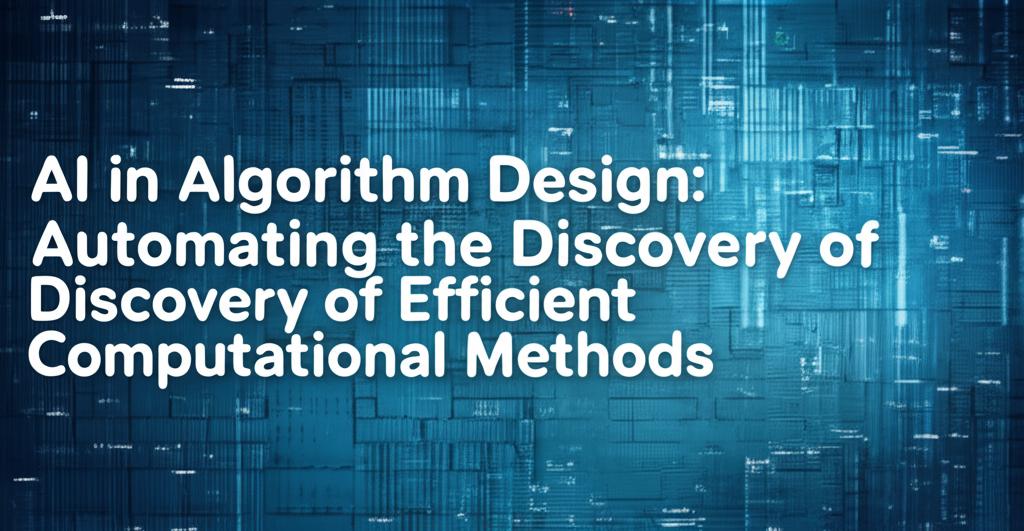Artificial intelligence (AI) is revolutionizing the field of algorithm design, paving the way for automated discovery of more efficient computational methods. This shift promises to streamline complex problem-solving, enhance performance across various industries, and push the boundaries of scientific research.
Key Developments and ImpactAI, particularly machine learning (ML) and deep learning, is increasingly being used to automate and optimize the creation of algorithms. Instead of relying solely on human intuition and expertise, AI systems can analyze vast datasets, identify intricate patterns, and generate novel algorithmic solutions or improve existing ones. This automated approach can lead to algorithms that are faster, more resource-efficient, and capable of handling complex, large-scale problems.
Recent advancements highlight AI's ability to:
- Accelerate Discovery: AI can significantly speed up the process of finding optimal algorithms by exploring vast solution spaces that would be impractical for humans to search manually. This is particularly impactful in fields like drug discovery and materials science, where AI models can predict the properties of molecules or materials, guiding researchers toward promising candidates.
- Enhance Efficiency: AI-driven optimization can fine-tune algorithms for better performance, reducing computational cost, time, and energy consumption. This involves techniques like pruning neural networks to eliminate redundant parts without compromising accuracy or using reinforcement learning to dynamically allocate resources.
- Solve Complex Problems: AI algorithms can tackle highly complex challenges that are difficult for traditional methods. For instance, AI is being used to optimize logistics and supply chains by analyzing real-time data to find the best routes and manage networks with greater precision.
- Generate Human-Comprehensible Code: Emerging methods like "deep distilling" allow AI to not only discover algorithms but also translate them into concise, human-readable computer code. This is a significant step towards understanding and trusting AI-generated solutions.
- Personalize Solutions: AI can tailor algorithms to specific needs and individual user preferences, such as personalizing customer experiences or adapting medical treatments based on genetic makeup.
- Drive Innovation in Hardware: The demand for more powerful AI models is also spurring innovation in computer hardware, including specialized processors like GPUs and TPUs, and even exploring new paradigms like neuromorphic and optical computing. AI itself is also being used to design more efficient chip layouts.
Several AI techniques are central to automating algorithm design:
- Machine Learning: ML algorithms, including supervised, unsupervised, and reinforcement learning, form the backbone of automated algorithm discovery. They learn from data to identify patterns, make predictions, and optimize outcomes.
- Deep Learning: Deep neural networks are particularly adept at handling complex, high-dimensional data and have shown success in areas like image recognition, natural language processing, and generating creative content, all of which can inform algorithm design.
- Genetic Algorithms: Inspired by natural evolution, these algorithms iteratively refine solutions to find optimal or near-optimal results for complex optimization and design problems.
- Bayesian Optimization: This technique is useful for optimizing black-box functions and is being applied in AutoML systems to select and configure causal discovery algorithms.
- Reinforcement Learning: AI agents can learn through trial and error, receiving rewards or penalties for their actions, to discover optimal strategies or control policies, which can be framed as algorithms.
- Generative AI and Large Language Models (LLMs): These models are increasingly capable of generating code and even suggesting novel algorithmic structures based on natural language descriptions or existing data. This is making algorithm design more accessible.
The field is rapidly evolving, with several exciting trends shaping the future:
- Agentic AI: AI systems are becoming more autonomous, capable of not just executing tasks but also reasoning, planning, and making decisions independently throughout the research and discovery process.
- Hybrid Approaches: Combining AI's strengths with human expertise remains crucial. Frameworks that facilitate human-AI collaboration are likely to yield the best results.
- Explainable AI (XAI): As AI plays a larger role in designing critical algorithms, the need for transparency and understanding how these AI systems arrive at their solutions becomes paramount.
- Quantum-Enhanced AI: The intersection of quantum computing and AI holds the promise of supercharging AI's capabilities for algorithm design, enabling faster training and more efficient processing of complex data. Generative AI is also being explored to automate and optimize quantum algorithm design.
- "Periodic Table" of Machine Learning: Researchers are developing frameworks to categorize and understand the relationships between different machine learning algorithms. This can help in systematically combining existing ideas to create new and improved AI models or algorithms.
- Addressing Data Scarcity: As AI models require vast amounts of data, researchers are exploring synthetic data generation and novel data sources to ensure continued advancement, especially as human-generated public data may become limited.
Despite the immense potential, challenges remain. Ensuring the reliability, robustness, and ethical implications of AI-discovered algorithms is critical. The "black box" nature of some AI models can make it difficult to understand why a particular algorithm works, which can be a barrier to adoption in safety-critical applications. Furthermore, the computational resources required to train sophisticated AI models for algorithm discovery can be substantial.
In conclusion, AI is poised to fundamentally transform how we discover and design efficient computational methods. By automating and augmenting human capabilities, AI will continue to unlock new efficiencies, solve increasingly complex problems, and drive innovation across a multitude of domains.

